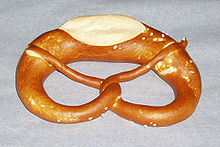Kringle
 | |
| Type | Pastry |
|---|---|
| Place of origin | Scandinavia |
Kringle /ˈkrɪŋɡəl/ is a Scandinavian pastry, a Nordic variety of pretzel, which arrived with Roman Catholic monks in the 13th century, especially in Denmark. It developed further into several kinds of sweet, salty or filled pastries.
In Danish and Norwegian, the word is kringle, plural kringler; Estonian: kringel, plural kringlid; Swedish: kringla, plural kringlor; Icelandic: kringla, plural kringlur; Finnish: rinkeli. The word originates from the Old Norse kringla, meaning ring or circle. The shape of the kringle has given name to a similarly entangled feature found in some proteins, the so-called Kringle domain.
In the Netherlands, a particular type of sweet kringle is well known under the Dutch name krakeling.
Denmark

In Denmark, kringle denotes the pretzel-like knotted shape rather than the pretzel pastry type. Kringles may be made from puff pastry (like Danish pastry) or yeast dough, filled with remonce or marzipan and raisins, sprinkled with coarse sugar, nut flakes or icing.
There are small salty kringles, saltkringler, being the Danish word for pretzels, and kommenskringler which are half-hand-sized breads in the kringle shape, made from unsweetened yeast dough with caraway seeds. Sukkerkringler are similar, sweet pretzels, sprinkled with sugar instead of caraway.
Kringles are pastries with a long history in Denmark, and are still popular items in modern Danish bakeries. The kringle symbol is one of the few ancient guild signs still used and a traditional golden kringle sign is often hung outside bakery shops.
United States
In the United States, kringles are hand-rolled from Danish pastry dough (wienerbrød dough) that has been rested overnight before shaping, filling, and baking. Many layers of the flaky dough are layered, then shaped in an oval. After filling with fruit, nut, or other flavor combinations, the pastry is baked and iced. In other parts of the United States, kringle refers to a slightly sweet, buttermilk cookie shaped like a pretzel or figure eight.[1]
Racine, Wisconsin, has historically been a center of Danish-American culture. Kringle and Danish culture are an important part of Racine's cultural identity, and several local bakeries make and ship hundreds of thousands of kringles each year.[2]
The Ballard area of Seattle, Washington, Solvang, California, central Iowa and Burr Ridge, Illinois, are among other places to find kringles in the U.S. In 2005, Dana College in Blair, Nebraska, held a Kringle Kontest, which was won by Kirsten's Danish Bakery in Burr Ridge, Illinois.
See also
References
- ^ Dedman, Sherry. "Kringla Danish Kringle Recipe". Old Recipe Blog. Retrieved 17 February 2013.
- ^ Marialisa Calta. "Fare of the country: Wisconsin, Danish Pastry With a Classic Twist". New York Times, July 9, 1989.
